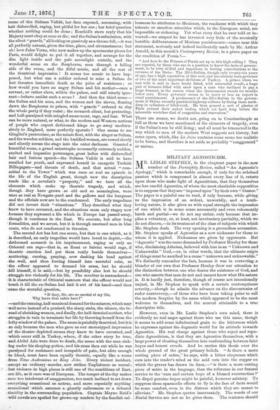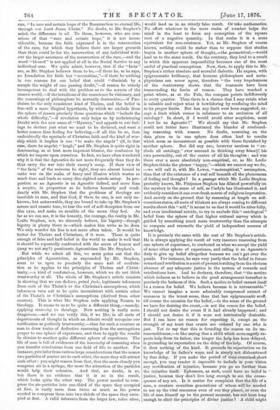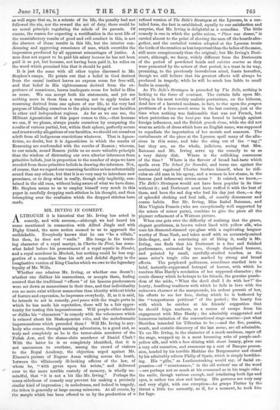MILITANT AGNOSTICISM.
MR. LESLIE STEPHEN, in the eloquent paper in the-new number of the Fortnightly Review, called " An Agnostic's Apology," whioh is remarkable enough, if only for the subdued passion which is compressed in almost every line of it, retorts upon those who make light of Agnosticism, that they themselves are less candid Agnostics, of whom the most charitable supposition is to suppose that theyare "imposed upon "by their own" bluster." The paper is a painful one to read, if only because, while giving us the impression of an ardent, unworldly, and .a truth- loving nature, it also gives us with equal strength the impression of one which is in some sense necessarily and even vehemently harsh and partial—we do not say unfair, only because that im- plies a voluntary, or, at least, not involuntary partiality, which we do not discern,—in its treatment of the class of subjects with which Mr. Stephen deals. The very opening is a groundless accusation. Mr. Stephen speaks of Agnostics as a new nickname for those to whom it is applied. Nicknames are given by opponents. But "Agnostic " was the name demanded by Professor Huxley for those who, disclaiming Atheism, believed with him in an " Unknown and Unknowable" God,—or, in other words, that the ultimate origin of things must be ascribed to a cause " unknown and unknowable." We distinctly remember the fact, because it was in correcting .a blunder of our own that Professor Huxley drew our attention to the distinction between one who denies the existence of God, and one who asserts that men do not and cannot know what His nature is. It is hardly just, therefore, though of course not intentionally unjust, in Mr. Stephen to speak with a certain contemptuous severity,—though he admits the advance on the discourtesies of ruder controversy,—of those who have been taking pains to call the modern Sceptics by the name which appeared to be the most welcome to themselves, and the nearest attainable to a true descriptive title.
However, even in Mr. Leslie Stephen's own mind, there is evidently no real anger against those who use this name, though it seems to add some infinitesimal grain to the bitterness which he expresses against the dogmatic world for its attitude towards Agnostics. His real charge against those who reject and repu- diate Agnosticism, is that they are Agnostics themselves, with a large power of cheating themselves into confounding between faint hopes and honest creeds. And he carries this thesis over the whole ground of the great primary beliefs. " Is there a more cutting piece of satire," he says, with a bitter eloquence which cuts into the reader's mind as the acid cuts into the copper on which the graver has drawn its lines,—" is there a more cutting piece of satire in the language, than the reference in our funeral service to the 'sure and certain hope of a blessed resurrection ?' To dispel genuine hopes might be painful, however salutary. To suppress these spasmodic efforts to fly in the face of facts would be some comfort, even in the distress which they are meant to alleviate." Mr. Stephen quotes inaccurately. The words of our Burial Service are not as he gives them. The sentence should
ran, "In sure and certain hope of the Resurrection to eternal life, through our Lord Jesus Christ." No doubt, to Mr. Stephen's mind, the difference is nil. To those, however, who are con- scious of that " sure and certain hope," it is not incon- siderable, because the faith expressed is in the resurrection of the race, for which they believe there are larger grounds than there could be for the resurrection of any individual with- out the larger assurance of the resurrection of the race,—and the word " blessed" is not applied at all in the Burial Service to any individual case. We quite admit, however, that if the " facts" are, as Mr. Stephen believes them to be, if there be, as he says, no foundation for faith but "moonshine,"—if there be nothing in our reasons for our belief that could "diminish by a scruple the weight of one passing doubt,"—if reason be utterly incompetent to deal with the problem as to the secrets of the unseen world,—if the intuitions of the conscience be visionary, and the reasonings of philosophers be mutually destructive,—if Pan- theism be the only consistent kind of Theism, and the belief in free-will a mere illogical hypothesis, by which we exclude from the sphere of reason precisely those questions which "include the whole difficulty,"—if revelation only helps us by rechristening Doubt with the new name of "Mystery," and appeals to our feel- ings to declare just what we want to be declared, and want a better reason than feeling for believing,—if all this be so, then undoubtedly the spectacle of Christian faith and the kind of wor- ship which it implies is one "to make the angels" (if, in that case, there be angels) " laugh," and Mr. Stephen is quite right in denouncing, as at best mere impotent bluster, the confusion by which we impose upon ourselves. In fact, we have often wondered why it is that the Agnostics do not more frequently than they do thus carry the war into their enemy's camp. If their view of "the facts" of the universe be right, they are almost bound to make war on the realm of fancy and illusion which wastes so much time and leads so many dim-sighted minds astray. In pro- portion as an Agnostic is an Agnostic indeed, and more than a sceptic, in proportion as he believes honestly and confi- dently with Mr. Stephen that the problems of theology are "insoluble to man, and that God, if there be one, is not only un- known, but unknowable, they are bound to take up Mr. Stephen's severe and caustic tone, to tear the veil of self-deception from our dim eyes, and make us sensible of the scorn they feel. As far as we can see, it is the honesty, the courage, the reality in Mr. Leslie Stephen, not, we sincerely believe, his bigotry—though bigotry in plenty there is—which makes him write as he does. We only wonder his line is not more often taken. It would be better for Theists and Christians, if it were. There is quite enough of false and half-belief in the world to make it well that it should be repeatedly confronted with the scorn of honest and (may we not say?) passionate Agnosticism like Mr. Stephen's.
But while we admit all this, we must point out that the principles of Agnosticism, as expounded by Mr. Stephen, seem to us open to precisely the same sort of confuta- tion as he applies to the principles of Theism and Christ- ianity,—a kind of confutation, however, which we do not think trustworthy at all. The whole of Mr. Stephen's article consists in showing that we can deduce, prima facie, legitimate inferences from each of the Theist's or the Christian's assumptions, which inferences turn out to be quite inconsistent with certain other of the Theist's or Christian's assumptions (derived from other sources). This is what Mr. Stephen calls applying Reason to theology. It seems to us to be quite a different thing,—namely, applying reasoning to theology. Now nothing is really more dangerous,—and we can verify this, if we like, in all sorts of departments of thought in which an Atheist would recognise our verification as perfectly trustworthy,—than for such a creature as man to draw trains of deductive reasoning from the assumptions proper to one sphere of experience, and then to apply the results he obtains to another quite different sphere of experience. The life of man is full of evidences of the insecurity of reasoning when you transfer conclusions from one field of life to another. For instance, you infer from various large considerations that the nearer two particles of matter are to each other, the more they will attract each other ; you might reason from that, that the more closely you compress air in a syringe, the more the attraction of the particles would help their cohesion. And that, no doubt, is so, but there is no evidence that it is so in the result, which looks quite the other way. The power needed to com- press the air-particles into one-third of the space they occupied at first, is vastly more than twice as much as the power needed to compress them into two-thirds of the space they occu- pied at first. A valid inference from the larger law, taken alone, would land us in an utterly false result. Or take mathematics. No effort whatever in the mere realm of number helps the mind in the least to form any conception of the square root of a negative quantity. In that realm it is a mere equivalent for non-existence. Yet, as Mr. Stephen of course knows, nothing could be rasher than to suppose that studies begun in another sphere of thought,—the geometricaf—would lead us to the same result. On the contrary, they lead to a result in which this apparent impossibility becomes one of the most useful of practical conceptions. Now, then, to apply this to Mr. Stephen's rather absolute and scornful dialectic. He argues, with epigrammatic brilliancy, that because philosophers and meta- physicians can never agree, therefore "the very hopelessness of the controversy shows that the reasoners have been transcending the limits of reason. They have reached a point where, as at the Pole, the compass points indifferently to every quarter. Thus there is a chance that I may retain what is valuable and reject what is bewildering by confining the mind to its proper limits. But has any limit ever been suggested, ex- cept a limit which comes in substance to an exclusion of all ontology? In short, if I would avoid utter scepticism, must I not be an Agnostic ?" We should say that Mr. Stephen could not better have illustrated the blunder of confound- ing reasoning with reason. No doubt, reasoning on the data given us in one sphere does often lead to results which seem as inconsistent as possible with those furnished by another sphere. But did any one, however anxious to " ex- clude all ontology," ever succeed in thinking away himself, his own personality, out of the centre of all his thoughts ; and was there ever a more absolutely non-empirical, or, as Mr. Leslie Stephen thinks the phrase "happy,"—which we cannot say we do, —we will call it, with Mr. Lewes, " metempirical," assumption, than that of the existence of a real self beneath all the phenomena of feeling and thought? In a passage which Mr. Leslie Stephen probably knows, Mr. Fitzjames Stephen has dilated powerfully on the mystery in the sense of self, as Carlyle has illustrated it, and evidently considers it one ever-fresh source of religious impression. And merely on the ground that by reasoning at length on self- conscious states, all sorts of thinkers are always coming to different results about this " self," it seems to us that it would be utter folly, and even intellectual suicide, to try to exclude this " ontological " belief from the sphere of that higher rational survey which is guided by something much more trustworthy than the attempts to compare and reconcile the yield of independent sources of knowledge.
It is precisely the same with the rest of Mr. Stephen's article. He is always applying the result of very insecure reasoning from one sphere of experience, to confound us when we accept the yield of some other sphere of experience, and calling it an Agnostic's duty to give up belief altogether because we can't get over the puzzle. For instance, he says very justly that the belief in future reward and retribution is a sort of protest resulting from the obvious absence of any adequate justice in the system of rewards and retributions here. And he declares, therefore, that "the motive which induces us to believe in the good arrangement hereafter is precisely the badness of this. Such a motive to belief cannot itself be a reason for belief. We believe because it is unreasonable." We cannot imagine a more admirably compressed extract of unreason in the truest sense, than that last epigrammatic scoff. Of course the occasion for the belief, —in the sense of the ground we have for desiring the event,—is not the reason for the belief. I should not desire the event if it had already happened ; and I should not desire it if it were not intrinsically desirable. But I can have no reason for expecting it, except on the strength of my trust that events are ordered by one who is just. Yet to say that this is founding the reason on its un- reasonableness,—is like saying that a child which more eagerly ex- pects help from its father, the longer the help has been delayed, is grounding its expectation on the delay of the help. Of course, it does nothing of the kind. It grounds its expectation on its knowledge of its father's ways, and is simply not disheartened by that delay. If you make the period of time examined short enough, you may render it impossible to include in your vision any rectification of injustice, because you go no further than the injustice itself. Ephemera, as such, could have no belief in ' justice, because they don't live long enough to see the conse- quence of any act. Is it matter for complaint that the life of a man, a creature countless generations of whom will be needed to use up the vital resources even of our tiny planet, or even the life of man himself up to the present moment, has not been long enough to elicit the principles of divine justice? A child might
as well argue that as, in a minute of its life, the penalty had not followed the sin, nor the reward the act of duty, there could be no moral principle regulating the minds of its parents. Of course, the reason for expecting a rectification in the next life of the unsatisfactory results of good and evil conduct in this, is not the absence of those results in this life, but the interior con- demning and approving conscience of man, which overrides the impression produced by all apparent miscarriages of justice. A man does not expect to be paid his salary because he has not been paid it as yet, but because, not having been paid it, he relies on the word which promised him that it should be paid.
It is just the same with all other topics discussed in Mr. Stephen's essays. He points out that a belief in God derived from the causal instinct leaves no express room for free-will, and that belief in His righteousness derived from the ex- perience of conscience, leaves inadequate room for belief in Him as cause. We can accept both his statements, and yet see nothing more in them than a warning not to apply trains of reasoning derived from one sphere of our life, to the very bad purpose of blinding ourselves to the plain teaching of our faculties in other and independent regions. As far as we can see, the Militant Agnosticism of this paper comes to this,—that because we can, if we please, always puzzle ourselves by comparing the results of various partial, but, within their sphere, perfectly secure and trustworthy allegations of our faculties, we should cut ourselves adrift from all indigenous convictions whatever. That is Agnos- ticism, no doubt, but it is Agnosticism in which the results of Reasoning are confounded with the results of Reason ; whereas, to our minds, sound Reason yields us no more valuable principle than the wisdom of distrusting our own ulterior inferences from primitive beliefs, just in proportion to the number of steps we have receded from those primitive beliefs in drawing the inference. Not, of course, that we regard our reasoning faculties as less substantially sound than any others, but that it is so very easy to introduce new premisses, or to drop what is really, though only implicitly, con- tained in the old ones, without being aware of what we have done. Mr. Stephen seems to us to employ himself very much in this paper in carefully dropping such stitches in his thought, and then triumphing over the confusion which the dropped stitches have made.




































 Previous page
Previous page